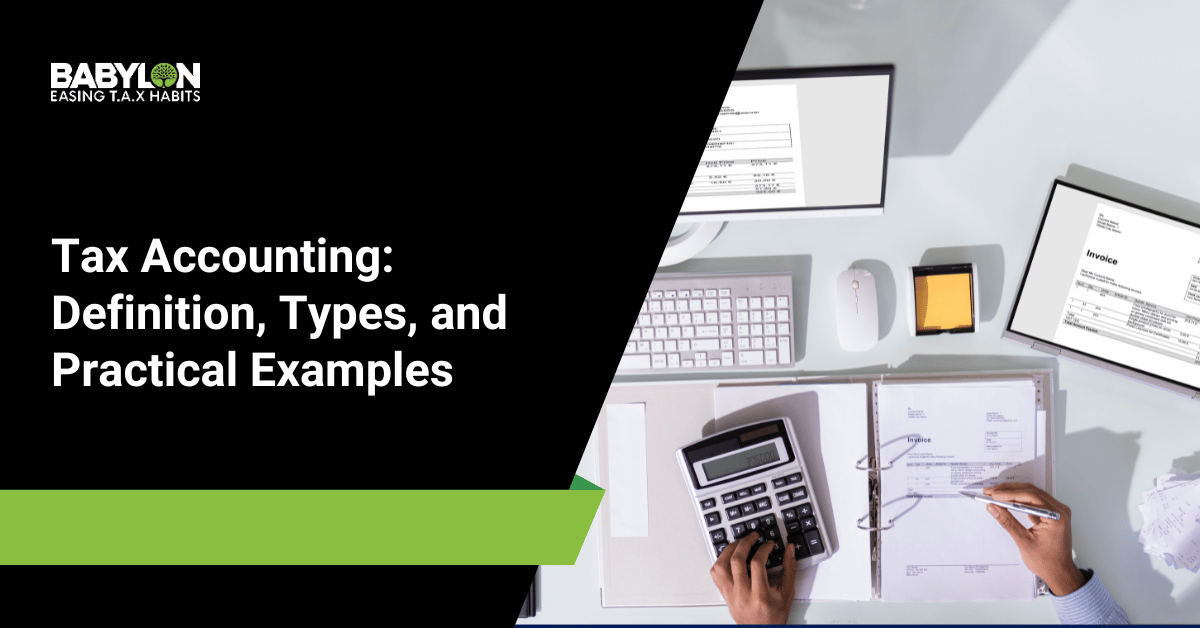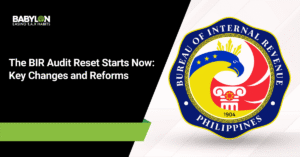Tax accounting is essential for managing financial obligations and staying compliant with tax laws. It involves recording, analyzing, and reporting financial information specifically for tax purposes.
Whether you’re an individual, a business owner, or part of a tax-exempt organization, understanding tax accounting helps you accurately calculate tax obligations, claim deductions, and maintain compliance with government regulations.
What is Tax Accounting?
Tax accounting is a specialized branch of accounting focused on tracking income, expenses, assets, and liabilities for accurately calculating taxes owed to the government.
Unlike general accounting, which assesses a business’s overall financial health, tax accounting is tailored strictly to comply with tax laws and regulations, following methods approved by the Bureau of Internal Revenue (BIR).
Tax accounting requirements can vary depending on the entity—whether an individual taxpayer, a business, or a tax-exempt organization.
What are the Different Types of Tax Accounting?
Each type of entity has unique tax accounting requirements. Let’s explore the different types of tax accounting and provide practical examples to illustrate how each works in real scenarios.
Tax Accounting for Individuals
Individual tax accounting focuses on recording and reporting personal income, deductions, and credits. It covers income from various sources, including wages, investments, and property rentals.
Individuals are responsible for filing an annual income tax return, which may include itemized deductions like mortgage interest, medical expenses, or education costs.
Accurate tax accounting ensures individuals calculate tax liabilities correctly and apply any eligible deductions or credits to reduce taxable income.
For example, consider Maria, an individual taxpayer who earns income from her job, rental properties, and investments. Maria needs to track each source of income to report accurately on her tax return.
To reduce her taxable income, she might claim deductions for mortgage interest on her rental property and any qualifying medical expenses.
Using the cash accounting method, Maria records her rental income when tenants make payments and her investment income when dividends are received.
This straightforward approach aligns her tax obligations with her cash flow, making her personal tax accounting manageable and compliant.
Tax Accounting for Businesses
Business tax accounting is more complex than individual tax accounting, as it requires tracking income and expenses tied to daily operations. This can include everything from sales revenue and payroll to inventory costs and asset depreciation.
Businesses must comply with corporate income tax laws, VAT on goods and services, and potentially other industry-specific taxes.
Accurate business tax accounting is crucial for avoiding penalties and optimizing tax benefits, such as deductions for operating expenses like advertising, travel, and office supplies.
Consider ABC Stores, a small retail business that sells household items. To manage its finances, ABC Stores uses tax accounting to track all sales, inventory costs, and eligible business deductions, like marketing and utility expenses.
The business follows the accrual accounting method, allowing it to record sales revenue when customers make purchases, even if payment has yet to be received.
This method gives ABC Stores a clear picture of revenue and expenses over time, helping them align income with costs, ensure compliance, and manage cash flow efficiently for tax purposes.
Tax Accounting for Tax-Exempt Organizations
Tax-exempt organizations, such as nonprofits, have specific tax accounting needs. Although they do not pay income tax, they must file information returns to report financial activity transparently.
Tax accounting for these organizations focuses on maintaining clarity in their revenue sources, donation allocation, and expenditures. These organizations must ensure that they use their funds in alignment with their stated mission to retain their tax-exempt status and meet government regulations.
For example, Hope Foundation, a nonprofit organization, relies on donations to fund its community programs. Tax accounting for Hope Foundation involves accurately recording donations as revenue and documenting expenditures to show they are aligned with the organization’s mission.
Although the foundation is tax-exempt, it must file annual reports detailing financial activities to retain its status and remain transparent with both the government and donors.
Key Components of Tax Accounting
Tax accounting involves several essential components that ensure accurate reporting and compliance with tax regulations. Understanding these components can help individuals and businesses manage their tax obligations effectively.
- Income Recognition: Income must be recognized accurately, whether from wages, investments, or business activities. The timing of income recognition depends on the chosen tax accounting method.
- Deductible Expenses: Identifying and documenting deductible expenses is essential, as they reduce taxable income. These expenses vary by entity type and applicable tax laws.
- Credits and Deductions: Tax credits and deductions are incentives provided by tax authorities to lower tax liability. Accurate calculation and documentation optimize tax savings.
- Assets and Depreciation: For businesses, tracking assets and calculating depreciation over time helps lower taxable income by accounting for the loss in asset value.
Related: How and Where to Get Your Tax Declaration Certificate in the Philippines
Tax Accounting Methods
Two primary methods are used in tax accounting for recognizing income and expenses: cash accounting and accrual accounting. The choice of method depends on the entity’s business structure and financial requirements.
Cash Accounting
The cash accounting method records income and expenses only when cash is received or paid. This straightforward method is common among small businesses and individuals, as it reflects actual cash flow.
Income is recognized when received, and expenses are recorded when paid, making cash accounting ideal for tracking liquidity without dealing with unpaid obligations.
Accrual Accounting
Accrual accounting records income when earned and expenses when incurred, regardless of when cash is received or paid. This method, commonly used by larger businesses, provides a more accurate picture of financial health by accounting for accounts receivable and payable.
Although it involves a more complex reporting process, accrual accounting aligns revenue with expenses over time, supporting long-term financial planning and reporting accuracy.
Rely on Babylon 2k for Expert Tax Accounting Solutions
Navigating tax accounting complexities is essential for staying compliant and optimizing your financial management.
Babylon 2k provides comprehensive accounting services to ensure accurate reporting and compliance with tax regulations. Our tax services cater to individuals, businesses, and tax-exempt organizations, helping you maximize deductions and maintain clear records.
Request a quote today and let us handle your tax accounting with precision and efficiency.
For more inquiries, message our AI chatbot, email us at [email protected], or contact us via Viber/WhatsApp at +63-927-945-3382.






